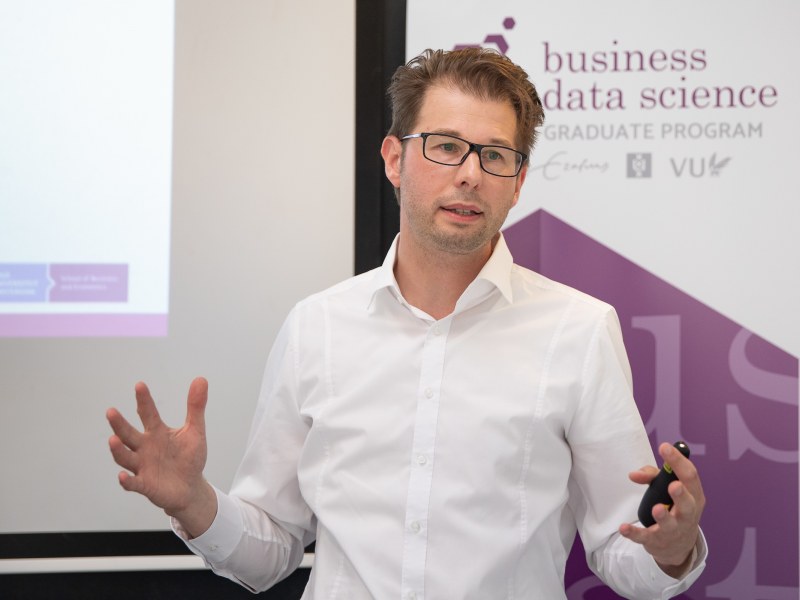Research Master Business Data Science
Learn more about the two-year Research Master Business Data Science at Tinbergen Institute.
The two-year program (120 EC) in Business Data Science is designed to prepare future PhD students in the business and econometrics departments (spanning disciplines such as business analytics, human resources, finance, marketing, entrepreneurship, and more), with a strong focus on data science.
This research master’s program is tailored for students with strong analytical and quantitative skills, providing rigorous training in preparation for a doctoral degree in business and econometrics departments. Students who successfully complete the research master’s program are supported in finding PhD positions at one of the three partner universities or elsewhere.
Acquiring skills
In year 1, the primary objective is to build a solid data science foundation and expose students to a variety of methodological approaches. These skills are applied to various business disciplines in the field courses.
First year overview:
| Block | Business and Data Science | (Advanced) Mathematics, Statistics and Econometrics | Research |
|---|---|---|---|
| 0 | Introduction | Refresher courses in Programming and Mathematics | Business Foundations |
| I | Decision Theory for Business | Fundamental or Adv Mathematics; Statistics or Asymptotic Statistics | Business Foundations |
| II | Machine Learning I; Parallel Computing and Big Data | Econometrics I or Advanced Econometrics I | Business Foundations |
| III | Machine Learning II | Econometrics II or Advanced Econometrics II | Business Foundations; Track-specific elective/Research; Hackathon/ Internship |
| IV | Simulation Analysis & Optimization; Deep Learning | Econometrics III or Advanced Econometrics III | |
| V | Track-specific field course; Natural Language Processing | Skills Workshop; Research Internship/elective |
See full list of courses (EUR Course Catalog).
Building knowledge
In year 2, students focus on a given business sub-discipline, selecting courses in a chosen sub-discipline: 1) quantitative finance, 2) management science, 3) operations analytics. The courses assigned for each of these sub-disciplines have been carefully selected by a team of experts with the aim of ensuring the perfect learning trajectory that will lead to substantive contributions in the fields of each particular sub-discipline.
Second year overview:
| Block | Business and Data Science | (Advanced) Mathematics and Statistics | Research |
|---|---|---|---|
| I | Field-specific field courses, Research Internship, Electives | ||
| II | Field-specific field courses, Research Internship, Electives | Bayesian Econometrics | Skills Workshop II |
| III | Field-specific field courses, Research Internship, Electives | Skills Workshop II; Thesis | |
| IV | Skills Workshop III; Thesis | ||
| V | Thesis |
Students also take the following courses in year 2:
- Bayesian Econometrics
- Research internships and/or electives
- Skills workshops (review process, academic writing and presentations)
- Research Master Thesis (30 credits)
See the full study schedule for year 2 and the Study Guide.
Academic and Examination Regulations
